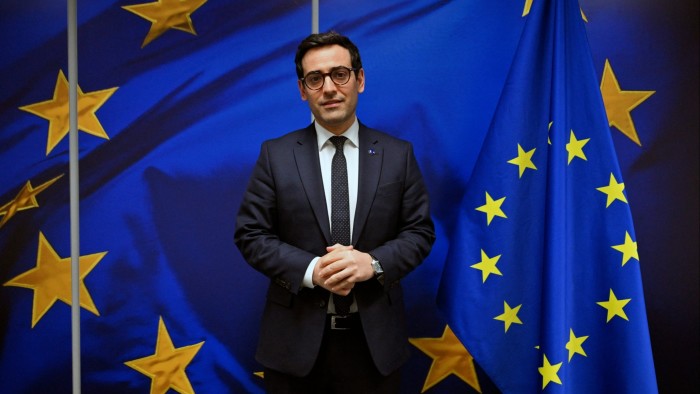Unlock the Editor’s Digest for free
Roula Khalaf, Editor of the FT, selects her favourite stories in this weekly newsletter.
Brussels wants EU governments to exclude foreign bidders in public procurement tenders and “buy European”, as the bloc attempts to reassert itself despite the impact of US President Donald Trump’s trade war.
Trump’s tariffs and threats to remove US protection from European countries unless they spend more on their militaries has spurred Europe to try and increase its self-sufficiency, from technology to defence and economic security.
Stéphane Séjourné, the EU’s executive vice-president for industry and the internal market, on Wednesday presented a plan harmonising rules across the EU and cutting down barriers in the bloc’s internal market. The plan addresses challenges from transferring workers between EU countries, to inconsistent standards for e-commerce and financial services.
One key element is introducing European preferences in upcoming changes to the EU’s public procurement rules, which Séjourné told the Financial Times was a “Buy European Act”.
“There is a will to remain a continent that is exporting internationally and at the same time to be lucid and less naive about strategic sectors,” Séjourné said.
EU governments could be allowed to bar foreign companies from bidding for government contracts for goods and services, if proposed changes to the public procurement rules are agreed next year. Current EU and World Trade Organization regulations prohibit favouring local suppliers.
The move represents a major shift in the EU’s attitude to open procurement and adhering to international rules. While it would protect strategic sectors from cheaper competitors from China and elsewhere, it could open it up to potential challenges from other countries at the WTO.
Séjourné, a former French foreign minister and close ally of President Emmanuel Macron, has consistently pushed for Europe to be more autonomous. He sees favouring European bidders in public procurement as a “first step”.
“Then we’ll look into the private sector with arguments around safety and economic security and see which sectors we can add.”
As well as the trade tensions with the US, concerns over privacy and data access have prompted calls for Europe’s tech sector to be more self-sufficient. The EU is also considering “buy European” elements in upcoming legislation on the cloud market, which is currently dominated by US companies such as Amazon, Microsoft and Google.
Séjourné declined to discuss specific sectors, but said that action was needed in areas where Europe was totally dependent on one country.
“In tech, we’re very, very dependent on the Americans. In raw materials, we’re 100 per cent dependent on the Chinese. These are sectors, in the current geopolitical context, [for which] we don’t want future generations blaming us for not having acted.”
Still, Séjourné was hopeful that the geopolitical challenges provided an opportunity for Europe, which has been fighting to boost its stuttering economy since the Covid-19 pandemic and the energy crisis that followed Russia’s full-scale invasion of Ukraine.
European companies have complained that they are strangled by the EU’s ambitious climate agenda, undercut by cheaper Chinese rivals and now are suffering the impact of Trump’s aggressive trade policy.
But Séjourné argued that Europe was in an “almost ideal” position, “in the sense of the trade-off that you can do one with the other, since the Americans remain our partners and the Chinese want to strengthen the partnership”.
It was possible to “make progress on many big difficulties with the Chinese in many sectors,” he said.
Source link









